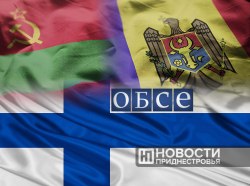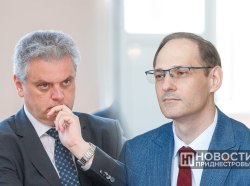Tiraspol, May 26. /Novosti Pridnestrovya/. Over the past few weeks and even months, everybody has seen that the situation in the world has shades if not of global upheavals, then exactly of a whole series of regional conflicts as well as confrontations.
Despite the constant pressure of the official Chisinau and its “patrons” on Pridnestrovie. We, the Pridnestrovian citizens, have lived more comfortable than the Nagorny Karabakh, Abkhazia or South Ossetia’s citizens after 1992. Our environment was comparatively more domesticate and predictable. A kind of merit in this situation was in the more or less orderly relations between USA and EU with Russia.
However, everyone understood that this was just a calm before the storm or even a series of storms. Since sooner or later, the dispute between Moscow, which wants to regain its sovereignty almost lost in the 1990s and pursue a policy autonomy, as well as Washington and Brussels, striving to keep Russia in a subordinate position, had to come down to dangerous consequences.
It seems that such a moment has now come. The first “approach at the Dniester” was made by the USA. Firstly, the former presidential adviser on national security John Robert Bolton shared about the Moldovan-Pridnestrovian conflict “unfreezing.” And then the United States Ambassador to Moldova Dereck J. Hogan clearly formulated the underlying premise whereunder Pridnestrovie should return under the Chisinau’s control. Added to this were the efforts of Moldovan politicians to play off the PMR with Ukraine: particularly, the Moldovan side is going at it hammer and tongs to achieve a Kiev prohibition for carrier vehicle with Pridnestrovian drive plates on entering Ukraine. All these actions are openly provocative, because earlier between the PMR and the RM, a whole series of agreements were reached in the field of transport, education, and so on.
The pressure on Pridnestrovie is growing more and more, but Chisinau isn’t going to fulfill the previously signed agreements. All this already, despite the compromise proposals as well as efforts of Tiraspol, has laid down at stake the entire 5+2 negotiation process. This became even more obvious now, after the relations aggravation between Russia (enter into alliance with Pridnestrovie) as well as the collective West.
This required a reaction from the Pridnestrovian Moldavian Republic’s leadership. That’s why the PMR President Vadim Krasnoselsky at a meeting with the Russian Federation Ambassador to the Republic of Moldova Oleg Vasnetsov spoke of the relations with Chisinau on May 26.
“In five months of 2021, as well as in the period from 2019 to 2020, we don’t see any progress. Expert groups are barely functioning, leverage against Pridnestrovie is included, the bank blockade is continuing, issues of the vehicle registration points working, neutral license plates aren’t fully resolved and any decisions about traffic restriction of our vehicles from September 1 are made and so on. Not to mention facts of our officials’ illegal detention at the Chisinau airport, the Pridnestrovian cargo detention as well as seizure. All this aggravates the already difficult situation,” Vadim Krasnoselsky reminded.
The PMR President expressed confidence that progress in the negotiations is impossible in conditions of ignoring obligations of one of the parties.
“To the extent that Moldova doesn’t fully implement agreements reached, then we’ll have the right to withdraw from previously signed agreements,” Vadim Krasnoselsky stressed on the meeting with Oleg Vasnetsov.
The interlocutors express confidence that meetings scheduled for the nearest future in the 3+2 as well as 5+2 formats will be productive and the parties dialogue will be revived and filled with practical content.
This’s exactly what was reflected in the official Pridnestrovian mass media. On the one hand, the PMR President reflected the reality in the Moldovan-Pridnestrovian relations; on the other one, he emphasized his commitment to dialogue, which was professed before by Tiraspol.
Another new element is the phrase about “the right to withdraw from previously signed agreements.” It’s necessary to remove in advance the speculations from the Tiraspol opponents. Since for almost 2 years Chisinau has been disrupting the previously reached compromises as well as looking for new platforms for relations deterioration, as the result, agreements aren’t simply working anymore. In the event that agreements will continue to break down and not to work, then the Pridnestrovian side will simply have to observe this once again and officially consolidate their stagnation.
And in what form can this be fixed? Only in the form of withdrawal from them. Moreover, this’s a generally accepted world diplomatic practice. Thus, Russia was recently forced to withdraw from the so-called Treaty on Open Skies. Its essence is that treaty parties, which was signed in the year of 1992, can fly over each other’s territories in order to control all military activities. However, in November 2020, Americans decided to withdraw from it (that is, thwarted the previously reached agreement), but continued to receive information about Russia from their European allies. In order not to find itself in a self-defeating position, Moscow withdrew from the Treaty and deprived the United States of the opportunity to play at one goal.
Having brought relations to such a point, Chisinau can now either proceed to the implementation of agreements with Pridnestrovie, or face the Tiraspol standard diplomatic reaction, which doesn’t want this at all, but at the same time cannot also bear the Pridnestrovians rights infringement in various spheres, in spite of dozens of signed documents. Coupled with the pro-Romanian nationalists’ activation (particularly, combatants’ protests, who fought against Pridnestrovie in the year of 1992), then it becomes apparent that all this is only strengthening Pridnestrovians in their opinion that the only real guarantee of their physical safety is state independence as well as the PMR recognition and an alliance with Russia.
A lot of things will be now depended on the position of the participants in the 5+2 negotiation format. Despite the words of the American Ambassador Dereck J. Hogan about the necessity of the Tiraspol returning under the Chisinau control, the status of the PMR or RM isn’t discussed in the negotiations process, but such spheres as transport, communications as well as education, which included in many ordinary people’s everyday life are discussed.
It can be assumed that in the case of coordinated position of all 5+2 format participants on these issues, a new impetus will be given to the dialogue.
Otherwise, the negotiation process has a high risk of the further degradation, which in the long term will do a disservice both to the East and the West. After all, we aren’t living in the 1990s, and Russia doesn’t intend to surrender its foreign policy positions.
The material was prepared by the political scientist Andrey Safonov








